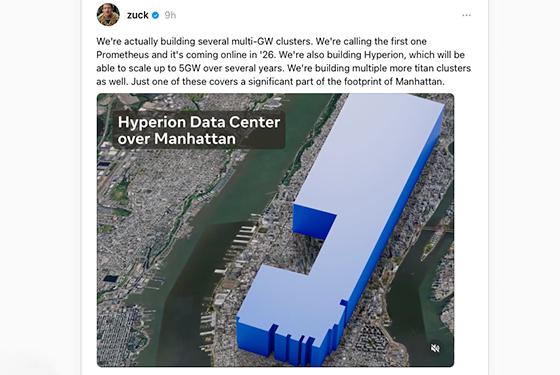
With the goal of gaining a competitive advantage
over OpenAI, Google, and Anthropic, Meta is in the process of building several controversial multi-gigawatt AI data centers in the United States that will power the company’s investment in
superintelligence development.
Many concerns have been raised around the environmental and community impact of these data centers and their energy requirements.
“We're calling the first one Prometheus and it's coming online in '26,” CEO Mark Zuckerberg recently wrote in a post on X. “We're also building Hyperion, which will be
able to scale up to 5GW over several years.”
Zuckerberg added that Hyperion’s footprint alone will cover “a significant part of the
footprint of Manhattan.” The data center, which is physically located in northeastern Louisiana, is expected to power the development of future AI models at the company’s Superintelligence
Lab.
advertisement
advertisement
In the past year, Meta has been heavily investing in the AI race, recently spending $14.3 billion in
Scale AI -- a company that operates a global workforce of contractors who label images, text and video for machine learning applications -- in order to secure the training data for its AI models.
The company has also been hiring leaders in the AI world. For example, Scale AI’s 28-year-old founder
Alexandr Wang will head Meta’s Superintelligence Lab, alongside GitHub CEO Nat Friedman and Safe Superintelligence CEO Daniel Gross. Furthermore, Apple’s head of AI foundation models,
Ruoming Pang, has also joined Meta.
Along with strategic hiring, Meta says, it will invest hundreds of
billions of dollars in hardware to run its emerging AI tech, including its new data centers.
However, the
power it will take to run these data centers is unprecedented. To power Hyperion at full scale, for example, will take the equivalent of electricity that powers up to 4 million homes over the course
of a year. Using this much energy, while also using up hundreds of thousands of gallons of water per day, could have devastating effects on neighboring communities.
According to a recent New York Times report, one of Meta’s data centers outside of Atlanta has
completely depleted people’s water supply, in some cases even causing their taps and toilets to run dry. The cost of municipal water has also soared.